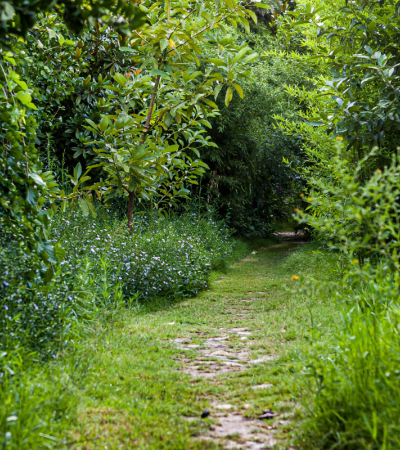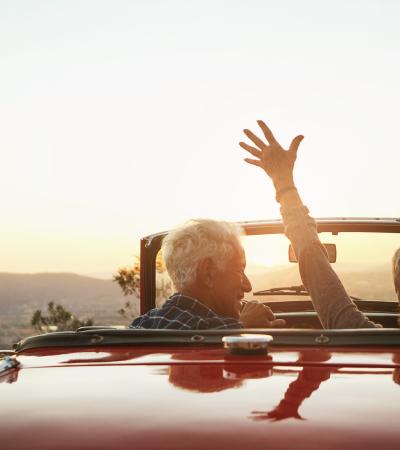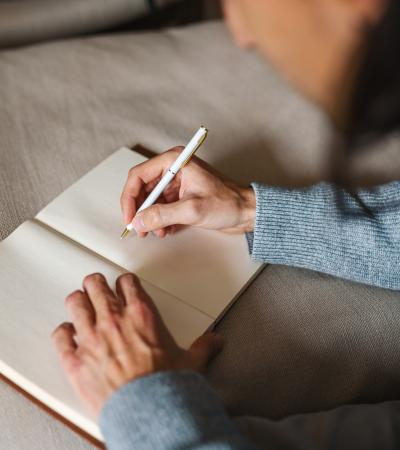What’s a Death Café?
According to its website, a Death Café is a place where “people, often strangers, gather to eat cake, drink tea and discuss death […] our objective is 'to increase awareness of death with a view to helping people make the most of their (finite) lives'.” There is no agenda, objective, or theme. It is a “discussion group rather than a grief support or counselling session.”
After attending my first Death Café, I can confirm that the above is true. It’s also true that Death Cafés are hard to explain to the uninitiated; it’s something that you need to experience to fully grasp. What’s not hard to explain is why Death Cafés are quite commonplace within libraries.
Discussing death at the library
I had the pleasure of chatting with Marché Pernell, EPL’s Robert Crown branch manager, as she set up hot drinks and snacks in the room before participants arrived.
Pernell told me that EPL has been hosting Death Cafés for a few years. It’s part of a series of many different Café-style programs, including the popular Repair Café, Language Café and Virtual Memory Café. She observes returning guests, but there are typically new faces every month, and the Death Café is especially popular, with registration quickly filling.
The library serves as the perfect third space for a group like this to meet. It is a free, neutral location (unlike if a Death Café were held in a funeral home or a house of worship) that is accessible to all members of the community. People already feel comfortable walking into the library, so there isn’t an added pressure on what might already be a bit of an anxiety-inducing program to attend.
Once participants began trickling into the room, some returning attendees began a small conversation as they began pouring tea, grabbing cookies and getting comfortable. Many attendees were first-time Death Café participants, like me, and expressed curiosity as to what we were about to experience. Soon after everyone took a seat within the circle of chairs, Alejandro Salinas, the Death Café facilitator, began the program.
Structure
Out of respect for my ten fellow Death Café participants, I won’t describe any details of the personal stories and thoughts shared during the program but will provide an overview of the structure of my session. Afterwards, I chatted with a regular participant who told me that the structure tends to change, which keeps discussions interesting and new every month.
Salinas, who has been facilitating Death Cafés since 2017, began with quick introductions around the room and brought out The Coffin Cards, a set of 115 coffin-shaped question cards that explore mortality, to help ignite conversations. Salinas is the current president of the Chicago Death Doula Collective, an organization that provides Chicagoans with holistic, inclusive, and accessible death care, death education and death advocacy. He created The Coffin Cards, which we utilized during this Death Café.
Each Death Café is different. Based on the model created by Jon Underwood and Sue Barsky Read, the first Death Café occurred in East London in September 2011. Operating as a ‘social franchise,’ Death Café has no staff. Instead, anyone who reads the guide can use the name and host their own event.
Back in Evanston, each participant chose a card from the deck and read their question aloud. Questions touched on dreams about death, experiencing a miracle, the worst ways to die, rude things to do at funerals, and family rituals and rites. Time was given for anyone to answer and ponder whatever card spoke most to them, and discussions sprang from there.
One of the main themes that emerged was legacy. Participants pondered whether it was important to leave behind a legacy, and if so, what that legacy looks like. We discussed the types of items we might pass down to loved ones, such as private journals or personal keepsakes, and how long we might be remembered for after we're gone. It was fascinating to hear the wide range of perspectives. Some participants had clearly spent a lot of time thinking about their legacy, while others, myself included, engaged with the idea more deeply for the first time.
The session opened and closed with time for mindfulness, stillness and guided breathing. Salinas remained gentle, affirming participants and their comments, questions and stories. He navigated the conversation in a way that was supportive of all and kept things flowing. People of all ages seemed to relate to each other, find common areas of introspection, and laugh at similar fears or experiences.
Unifying experience
Our group was open to vulnerability from the second the doors closed, and the sounds from the rest of the building were drowned out. As others also expressed, being in the library space was a large part of why I felt so comfortable in my Death Café experience.
One participant said she got quizzical looks once she told her friends her evening plans. She told them she didn’t know what a Death Café was either — just that it was at the library, and that was enough of a reason for her to try it out. Another participant said she came to the previous month’s program and returned out of curiosity because new people bring new perspectives, plus the library is a quick walk from her house.
Contrary to people’s first reactions to the program's name, Salinas says it’s a space where he’s seen many more people laugh than cry, and that was absolutely the case in my session.
We wrapped at 8 p.m. on the dot, and the doors opened back up to the community center's energy. It was remarkable to see a group of strangers be so open and vulnerable with each other during that quick hour and a half and then leave to go back to their own lives. Death, being a universal experience, ties us together, though we rarely take the time to talk about it.
Now, after attending a Death Café, it seems to me that people are longing for a space to discuss this topic. Whether someone comes for just one session or is a monthly participant, the Death Café is a worthwhile experience, and the library offers a calm home for this type of community gathering. Learn more about Death Cafés and how to get started to host one at your library.



